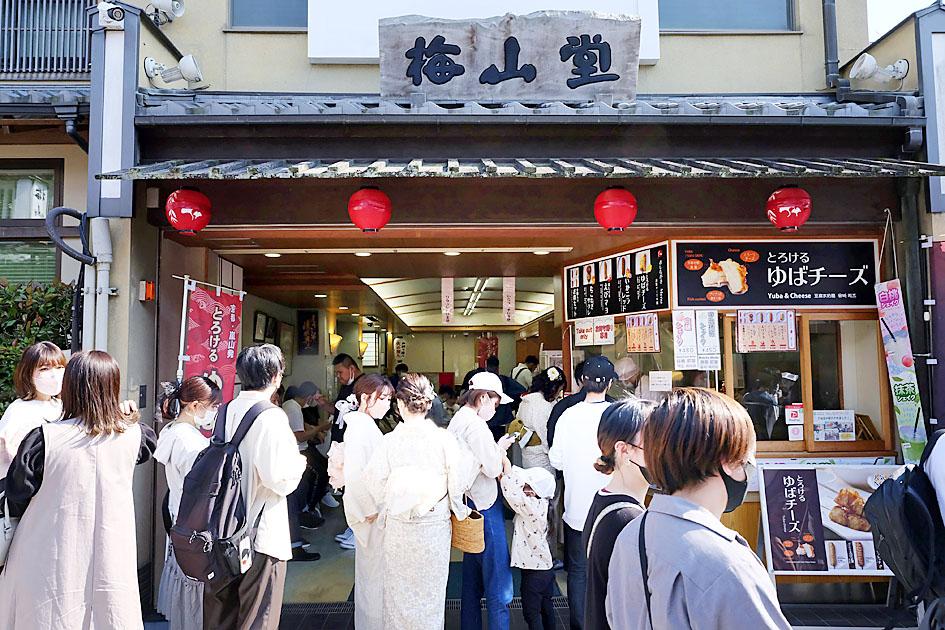Japan is set to allow in some package-tour tourists from overseas starting on June 10, Japanese Prime Minister Fumio Kishida said yesterday, ending a ban that was introduced about two years ago as part of the country’s COVID-19 control program.
“Active exchanges between people are the foundation of the economy and society,” Kishida said in a speech at the Future of Asia conference in Tokyo. “From the 10th of next month, we will restart the admission of tourists on guided package tours.”
He added that preparations would begin to allow international flights to land at New Chitose Airport in Hokkaido and Naha Airport in Okinawa starting next month.

Photo: Bloomberg
Tourist numbers are likely to remain limited at first. Japan has already announced it would double its cap on arrivals from overseas to 20,000 per day starting next month, although this remains far below the levels seen before the COVID-19 pandemic.
Kishida pledged in a London speech to make it as easy to enter Japan as other G7 nations.
Kishida has come under pressure from business lobbies to further open the borders, as the travel industry is losing out on what could have been a windfall from the weak yen. The prime minister must also avoid alienating a public wary of the potential health implications ahead of a July election for the Japanese House of Councilors.
A poll published by Mainichi Shimbun over the weekend found that 43 percent of respondents were in favor of relaxing border controls, while 41 percent were against the idea.
Japanese Chief Cabinet Secretary Hirokazu Matsuno said this month that the easing of restrictions would mean about 80 percent of arrivals would be able to enter the country without undergoing testing on arrival, or quarantine.
Countries and regions would be divided into three categories — red, yellow and blue — depending on their assessed virus risk, according to a joint statement from the Japanese Ministry of Foreign Affairs and other ministries.
Travelers arriving from countries or regions on the blue list would be able to bypass quarantine as long as they pass a pre-departure polymerase chain reaction test, the foreign ministry said.
Those on the yellow list must provide proof of vaccination with selected vaccines to skip quarantine.
The South China Morning Post yesterday reported that Japan is considering putting Hong Kong on the blue list, citing an unidentified person.

SECURITY: As China is ‘reshaping’ Hong Kong’s population, Taiwan must raise the eligibility threshold for applications from Hong Kongers, Chiu Chui-cheng said When Hong Kong and Macau citizens apply for residency in Taiwan, it would be under a new category that includes a “national security observation period,” Mainland Affairs Council (MAC) Minister Chiu Chui-cheng (邱垂正) said yesterday. President William Lai (賴清德) on March 13 announced 17 strategies to counter China’s aggression toward Taiwan, including incorporating national security considerations into the review process for residency applications from Hong Kong and Macau citizens. The situation in Hong Kong is constantly changing, Chiu said to media yesterday on the sidelines of the Taipei Technology Run hosted by the Taipei Neihu Technology Park Development Association. With

A US Marine Corps regiment equipped with Naval Strike Missiles (NSM) is set to participate in the upcoming Balikatan 25 exercise in the Luzon Strait, marking the system’s first-ever deployment in the Philippines. US and Philippine officials have separately confirmed that the Navy Marine Expeditionary Ship Interdiction System (NMESIS) — the mobile launch platform for the Naval Strike Missile — would take part in the joint exercise. The missiles are being deployed to “a strategic first island chain chokepoint” in the waters between Taiwan proper and the Philippines, US-based Naval News reported. “The Luzon Strait and Bashi Channel represent a critical access

‘FORM OF PROTEST’: The German Institute Taipei said it was ‘shocked’ to see Nazi symbolism used in connection with political aims as it condemned the incident Sung Chien-liang (宋建樑), who led efforts to recall Democratic Progressive Party (DPP) Legislator Lee Kun-cheng (李坤城), was released on bail of NT$80,000 yesterday amid an outcry over a Nazi armband he wore to questioning the night before. Sung arrived at the New Taipei City District Prosecutors’ Office for questioning in a recall petition forgery case on Tuesday night wearing a red armband bearing a swastika, carrying a copy of Adolf Hitler’s Mein Kampf and giving a Nazi salute. Sung left the building at 1:15am without the armband and apparently covering the book with a coat. This is a serious international scandal and Chinese

COUNTERINTELLIGENCE TRAINING: The ministry said 87.5 percent of the apprehended Chinese agents were reported by service members they tried to lure into becoming spies Taiwanese organized crime, illegal money lenders, temples and civic groups are complicit in Beijing’s infiltration of the armed forces, the Ministry of National Defense (MND) said in a report yesterday. Retired service members who had been turned to Beijing’s cause mainly relied on those channels to infiltrate the Taiwanese military, according to the report to be submitted to lawmakers ahead of tomorrow’s hearing on Chinese espionage in the military. Chinese intelligence typically used blackmail, Internet-based communications, bribery or debts to loan sharks to leverage active service personnel to do its bidding, it said. China’s main goals are to collect intelligence, and develop a